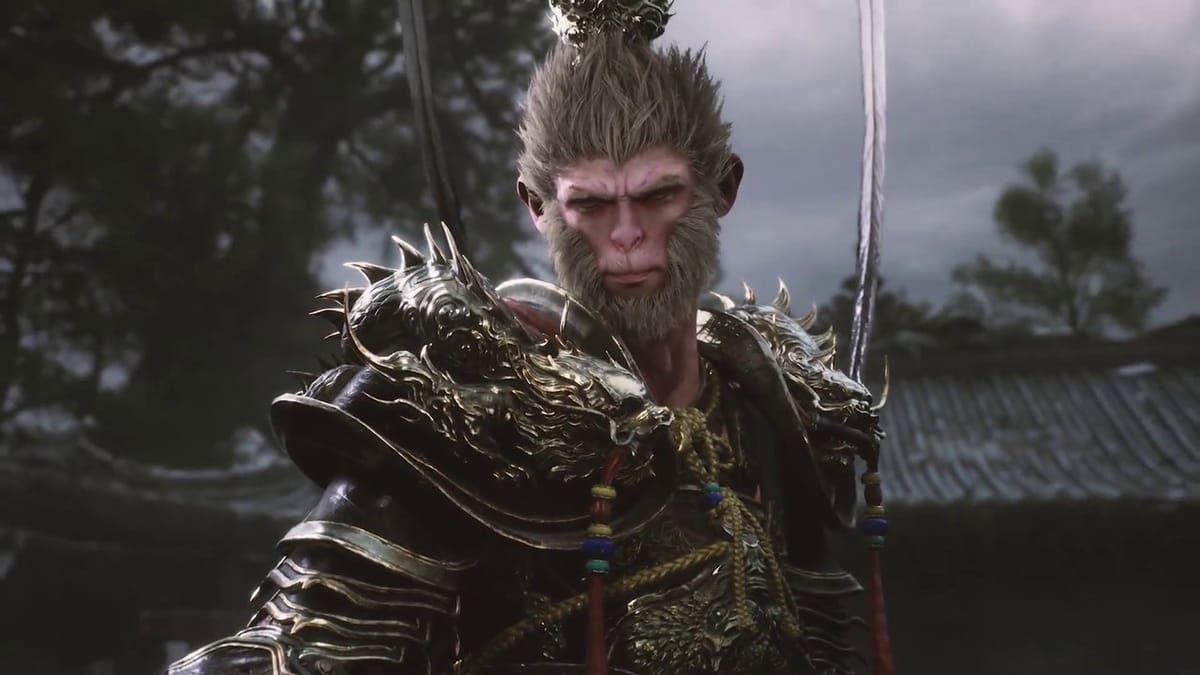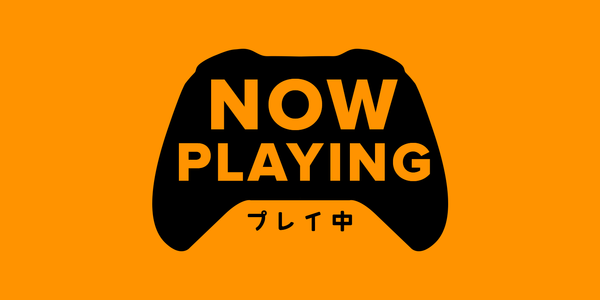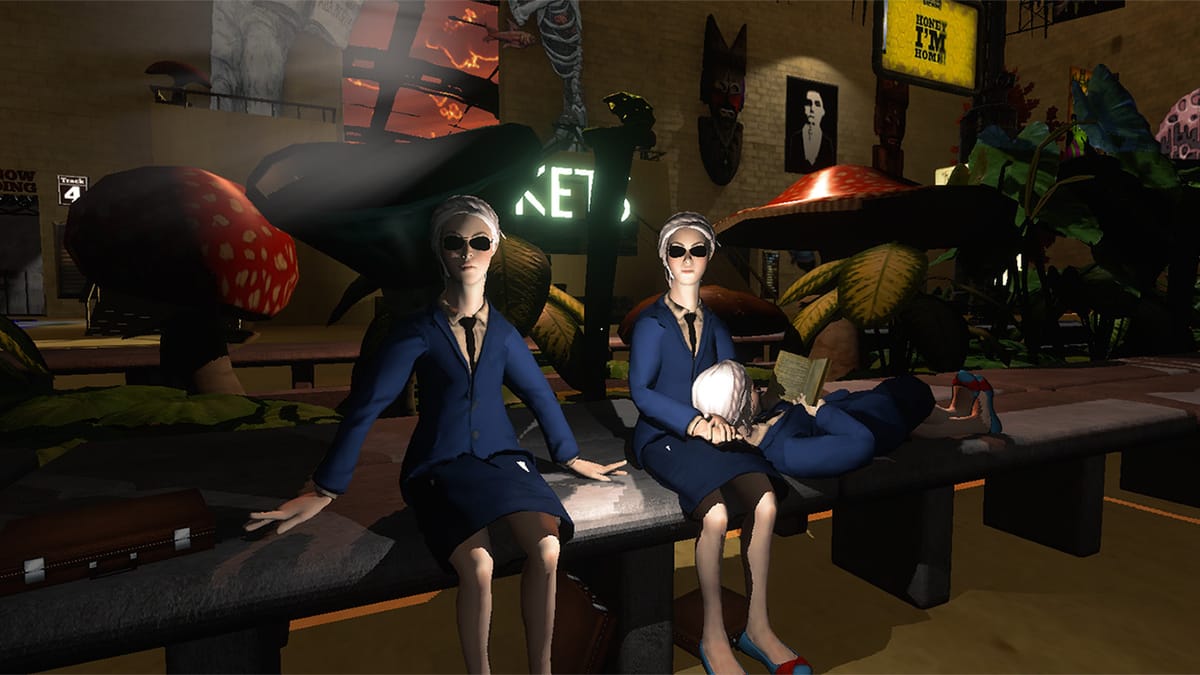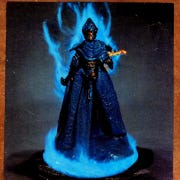The Monkey's Mind
Black Myth Wukong shows us reactionaries are dumb as fuck.

Minor and major spoilers for Black Myth: Wukong throughout the article.
Black Myth: Wukong is a weird hill for right-wing gamers to die on. I will confess, when the first trailers dropped, I was interested in this high-fidelity, Journey to the West-inspired monkey game – an excitement that quickly deflated with what I perceived to be another run-of-the-mill souls-like. The game developers' sexist remarks also left a sour taste in my mouth.
I ignored the game and thought little of it. Then it was released earlier this year, to great success and 10 million copies sold. Along with it came a sludge of reactionary takes. The alt-right took it as a victory lap – a worthwhile victory in the ongoing culture war against "Sweet Baby Inc poisoned", "woke" gaming journalists. They celebrated the fact a game in which you play as a simian sold better than most games that focus on diversity. Hidden beneath the muck, were some stellar reviews from respectable publications – from writers whose opinions I hold dear and near to my heart.
I bit the bullet and bought it. It's difficult to be a "hardcore" gamer of any stripe and not run into a game developed by raging misogynists. Since I engage with this hobby of mine critically, I was confident that, if the creators' attitudes about women were front and center, I could systematically analyze them and proceed to break them down.
I am happy to report that Black Myth: Wukong is not mired in the prejudice of its developers. It's a thoughtful cultural product that is faithful to its source material. The people behind the game may not care much about women, but they clearly have a lot of admiration and respect for their own culture. It shows in the final product – in their take on mythical China, full of yaogauis and powerful Bodhisattvas.
Black Myth: Wukong is becoming a fraught symbol for anti-woke gamers in ridiculous ways. The game hasn't reached widespread success because gamers are tired of diversity. It's earned its laurels because it's a significant, wonderfully realized, AAA game from China. It's full to the brim with themes that are evocative and speak to the human condition. It's not a 'lesson' on how diversity, equity and inclusion are bad for the industry (and it's a ridiculous take to begin with, as those are all, dare I say, very good creeds to have in the industry). It's a tale about freedom - about defying the natural order and break the chains that bind us. Frankly: reactionaries have very poor media literacy, and their lunacy ends up betraying them every step of the way.

As a queer trans woman, I did permanent psychological damage to myself when I partook in the myriads of videos, articles and forum posts by the same people who whine whenever there are "pronouns" in a game or cry "white erasure" when they play as a character that's something other than a scruffy, brown-haired, white guy.
I have a bit of a journalistic dilemma in my hands – I want to commit to proper citation, but I don't want to post links to these sources, because I don't want to direct traffic to reactionaries. I watched these youtube videos and they made a dime out of me, save yourself from my fate. So, rather than point to specific arguments or people, I will tackle the more common and general arguments made.
Let's start off on common ground – there is one opinion I can cross the aisle for. Black Myth: Wukong is a good game. Hell, it might even be a great game. The combat is a monkey-dance of acrobatic rolls and accurate staff whacks. In the same fashion Sekiro is all about mastering the art of parrying, Wukong demands that you git gud at dodging – evading attacks at the last second builds up your focus points, and so do constant attacks on enemies. Once you have enough focus, you can unleash brutal heavy attacks and varied combos to stagger your foes.
The combat is bolstered by some utility spells. Freezing the giant bosses in place, proceeding to beat 'em up with a stick always manages to stay fresh and engrossing. You can create multiple copies of yourself to fight by your side and transform into all manner beasts with their own strengths, weaknesses and combos. You can even turn your monkey body into stone to parry incoming blows – that satisfying CLANG sound always precipitated a smirk from me, ready for a counter-attack.
Many people derisively call this game a "boss rush", but the setting does offer some wide open areas with enemy goons and alternate pathways for you to explore and gather money, resources and crafting/upgrade materials. This mislabel comes from the fact the bosses are the stars of the show – you are constantly being thrown into stages and arenas with various bosses inspired by Chinese mythology (and even some recognizable villains from the novel).
The game is seriously let down by its level design. The overabundance of invisible walls makes the world feel rather inorganic. It stifles the joys of exploration. Some pathways lead to dead ends, with nothing interesting to look at or collect. Some ledges can be jumped on whereas others won't allow you to step foot past their unseen barriers. As much as the game attempts to funnel you down its mostly linear paths, the lack of landmarks and the same-y aesthetic of each biome makes getting lost quite easy – and finding chests a chore.
It's hard to get mad at this when the levels are so impressively beautiful to look at. The aesthetics and story of Black Myth are ultimately what won me over. In the same manner a VaatiVidya video might help you understand the Dark Souls lore, having a basic understanding of Chinese religions, mythology and Journey to The West allowed me to contextualize plot points and story events. It does storytelling similar to the FromSoftware method – very little is spelled out to you. You have to burrow and frown over item descriptions, dialogue and aesthetic clues to piece the story together.
The common quote I heard following the praise of the game was that Wukong is a "wake-up call" for the industry, a marker of what games should be – "a full game, with no micro-transactions, that follows no trends". On that last point, I call bullshit. Wukong does mimic certain trends. It incorporates known elements from FromSoft games, such as a gourd that regenerates your health and shrines that serve the same purpose as bonfires or sites of grace. Then there's the cryptic way it presents its story and the general game-feel of its combat. Black Myth has its own rhythm, sure, and death is not nearly as punishing as it is in the Souls games, but it's clear where the inspiration comes from.
There's a subtle statement when reactionaries say this game doesn't follow trends. They can't be blind enough to realize how much Black Myth: Wukong is shaped by contemporary 3rd person action games. No – when reactionaries state this, they mean to imply this game doesn't have 'forced DEI', or 'forced wokeness'. They see inclusive representation in games as nothing more than a 'trend' – and Wukong as a pillar that defies this current.

Reactionary belief is, in many cases, the result of a lack of imagination. Reactionaries have been so succinctly shaved and beaten down by capitalism, that their narrow worldview prevents them from conceiving of a better world, where people of all races and genders can live in peace, with all their needs taken care of. Their lack of imagination leads to flaws in their arguments.
I believe the majority of Wukong enjoyers aren't playing the game to dab on "wokeness" and resist "forced representation". Reactionaries believe this because they fail to contextualize the high number of players to its majority Chinese player-base. The game stands as a shining achievement from a huge, populated country, with its own gigantic and powerful tech industry.
The main gripes I observed from these gonads are that they believe there's a certain unfairness to the criticism. Many claim that the sexist tweets are badly translated or that the journalism covering the game pre-release was biased and one-sided. To them, the accusations are the result of "woke media gone wrong".
Yet, I don't understand how you can't tie a knot between these accusations and the recorded instances of Game Science fostering a toxic environment for women, when the game's co-publisher stated themselves they didn't want streamers to promote "feminist propaganda" while playing their game.
Still: this is an ongoing problem not with Wukong as a game, or its developers, but a corruption in the industry as a whole. Reactionaries fail to see how people are pushing for diversity not for the sake of shallow inclusion, but to foster a welcoming environment for all gamers and developers.
They point to shallow critiques from "woke" journalists who claimed the game is soiled by its lack of representation. I tend to have a more moderate opinion: there are plenty of female characters that mark their appearance in Black Myth Wukong – you just have to play past Chapter 2. They are not depicted for the male gaze, despite their conventional attractiveness. The game showcases female characters from Journey to the West with the same complexity as the classic novel. While they may be, at times, villains and fierce opponents, they are depicted as tragic or mythical figures. The women in Wukong possess agency and power, they move the plot forward with their actions.
I hold firm in my idea that if reactionaries had any semblance of media literacy that wasn't so wholly corrupted by their worldview, they would notice that the themes of the games and its source material transcend contemporary conversations about representation. The original novel is about abandoning, and at times actively fighting, prejudice, to become wise and charitable by following the path of Buddhism. It's an allegory for enlightenment. The game itself is a tale about rebellion, post-Buddhahood.

In the classic Chinese novel, the various main characters embody various facets of the human mind, spirit and heart. The Monkey King, Sun Wukong, is a metaphor for the Buddhist concept of the "heart-mind monkey". It describes human impulse and lack of control in one's thoughts and actions, leading to restlessness and half-baked decisions.
Sun Wukong is a callous and petty character at the start of the novel. He wages war against the bureaucratic Celestial Court, calling himself The Great Sage Equal to Heaven, incurring the ire of the Jade Emperor himself. His brash nature betrays him – he goes on multiple unstoppable rampages against the Heavenly Host, mostly due to his own sense of entitlement.
Nobody can stop the overpowered Monkey King. He is 7 times immortal. He has a staff that can change size as he sees fit. He has mastered the 72 transformations. He can create an army of clones, all with the same abilities and intellect as the original. It took the Buddha himself burying him under a mountain to end his violent crusade.
It is the sacred Buddhist Monk and main character of the classic book, Tang Sanzang, who frees Sun Wukong from his stone prison. The Monkey King becomes his first companion on the quest to recover sacred Buddhist scriptures from India and guarantee their safe return to China. To keep his violent impulse in check, the monk is granted an irremovable circlet to place on the monkey's head – a circlet that can reduce in size, causing unbearable pain for its wearer.
Despite being unwillingly forced on this journey, Sun Wukong learns temperance from his master's teachings. He follows the path of Buddhism to the end. He conquers the monkey in his mind.
Once back from India with the scriptures in hand, he is granted Buddhahood. He has achieved enlightenment. As the Buddha, the whole world now resides in his palms. He is one with everything in the Universe. But Buhhadhood is the circlet on his head – it is a shackle that enslaves him under the whims of Gods and Heavenly Courtiers.
The game picks up after the novel has concluded. Sun Wukong cannot abandon his obsession with freedom. On the contrary, in achieving enlightenment, his strive for a life of liberty and peace with his monkeys only intensifies. The Celestial Court, fearful of his power, starts massacring his fellow monkeys. The intro shoots you right into the plot, with Sun Wukong clearly stating his intentions:
"My master – safe! The scriptures – sound! All I ever wanted was a life in my mountain, free from you and your so-called merits. Those high above don't trust me, I understand that. And they send you and those knuckleheads...to threaten me to obey and serve once more. Hmm, I understand that too. But what I don't understand is...you bastards killing my kind!"
He battles Erlang Shen, the three-eyed God. He almost achieves victory, until he is hit with a brutal revelation: when granted Buddhahood, the circlet on his head was never removed. It was simply made invisible. Through the activation of the circlet, Erlang defeats and imprisons the Monkey King, turning him into a stone egg. Before he does, Sun Wukong separates his senses into six relics, scattering them across the land.
This is where your story begins – as the unnamed monkey called the Destined One, almost a carbon copy of Sun Wukong, you are sent on a mission to recover these relics in the hopes of reviving the Virtuous Fighting Buddha.
There's an anti-authoritarian edge to Sun Wukong's nature in the intro. His banter, his ability to ridicule those in power. Sun Wukong has overcome the monkey-mind – that impulse that holds people to violence, prejudice and distrust. He wishes to break free from his circlet. "Watch me rip it off!" he cries (in the secret ending).
I don't mean to imply that Black Myth: Wukong adheres to one political dogma with its narrative, but that the tale of the game presents itself as one of liberation under the lens of spirituality– a traditionally conservative philosophy, that of the "all these women and Black people are ruining my games" is inherently countered by a tale of rebellion. It's what I've been trying to extrapolate all along – that a AAA, Chinese-made videogame about monkey freedom is a weird cultural object to use as a defense for reactionary beliefs.

The Destined One follows the path of liberation – manifested through the revival of his Monkey Regent. In his quest to recover Wukong's senses, he finds the relics in the possession of the final bosses of each chapter. While multifaceted and complex in their motivations, they all encompass some manner of sin.
A black bear cannot move past the loss of his comrades, so revives his friends, corrupted by their immorality even after death. A rat cuts off his master's head in his lust for power. A fake Buddha believes the path to Nirvana can be carved with bloodshed and material satisfaction. A lovelorn spider is forced to commit atrocities under the gaze of a hundred-eyed Daoist master. A red demon thirsts for vengeance against his natural enemy – the Celestial Court.
Depending on which choices and optional bosses you've defeated, you unlock one of two endings. Before then, the bombshell revelation remains the same. You, the Destined One, are a form of reincarnation for Sun Wukong. His final sense and relic, the Monkey's Mind, was inside you all along. Turns out the entire game has been a plot hatched between the Monkey King and Erlang Shen. A convoluted plan to finally grasp freedom.
Either you recover Wukong's memories and break the circlet, or become enslaved by the same object that secretly bound Wukong in control and submission.
The game does not manifest a return to traditionalism that reactionaries crave. In gameplay, the game is shaped by contemporary trends and motifs commonly found in 3rd person action games. The sexism everyone has been waging a culture war on is practically non-existent – the themes of the games transcend conversations about representation.
I wish reactionaries took a lesson from this critical reading of the game's themes, rather than so unabashedly focus on the conversations happening outside of the game. They too, have plenty of prejudice and base emotional reactions when confronted with something that doesn't agree with their worldview. I feel as though their ideology is a circlet that keeps them bound to bureaucracy and the powers that be.
They will be happy when we all have circlets – when we no longer desire a better, unchained world. I wish to break my circlet, I wish to be free. I want to overcome the monkey-mind. Reactionaries, by their own philosophy, cannot move past their base instincts unless they do the work – if they go on their journey to transcend conservatism. I say let Sun Wukong be their shepherd. Samsara will sort them out – what positive karma can be attained by such vitriol?
They are playing a game blinded by their monkey-mind and their sins: so focused on their hollering and screeching when defending misogynists they fail to see the game is screaming for them to consider the path of liberation – freedom for all.
This is the ultimate tragedy of Black Myth: Wukong – a good game that cries for its players to consider freedom from oppression, beloved by those who want the status-quo to return to what it was. Similarly to the "bad" ending, reactionaries all don their circlets – ignorant of Sun Wukong's master plan and thirst for freedom. They remain enslaved to their monkey-mind – controlled by their prejudice and assumptions.
THE DESSERT CART

For once, we actually have a full dessert cart! Lots of wonderful sweet treats for you to enjoy.
First and foremost, wanna give a shoutout to my new patron Ignas Vieversys – thank you for the coffee!
Another shoutout to recent patron Lawrence Adkins – thank you for buying me your favorite snack! Those pretzel rods were deliciously crunchy and salty – perfect for a mid-break munch in between thwacking yaoguais with my staff.
Lawrence and Ignas are both writers for Superjump, the independent magazine I happen to write for outside of ...Or How I Learned To Stop Caring. Lawrence weaves words and opinions about gaming with deeply personal and original gravitas. Their passion is unique, and I can feel in them a camaraderie when it comes to our love of gaming. Ignas is a wonderful interviewer that is able to coerce interesting and profound answers from all the game devs he talks to. In an alternate world, where I make my own Yakuza ripoffs, I hope I am being interviewed by Ignas. I will link below their two author pages, so you can peruse all the wonderful content they produce for the publication.


I recently interviewed Cosmo D for Superjump. He is the brain-father of surreal and psychedelic exploration games such as Tales from The Off-Peak City Vol. 1, The Norwood Suite and Betrayal at Club Low. I had the honor to ask him about the videogames that inspired him, his literary influences and (because I am the writer that I am) I couldn't pass up the opportunity to ask one of my favorite developers what he likes to eat. You can check it out below.

And speaking of Superjump: we released our very first Youtube video! I can't take credit for anything, however – I had no part in the production. It's the brainchild of our wonderful editor James Burns, who contributed the words, and video editor Jeremy B. Mitchell Wolfe helped greatly by lending their beautiful voice for the narration. It would mean a lot to all of us if you watched it! It's a history of Nintendo as they were careening towards the creation of the Nintendo Entertainment System. The highest praise came from another Superjump contributor, James O'Connor, who stated: "...even though I feel like I know Nintendo inside out I still learned a lot". Click play below or I'll assume you smell like rotten eggs.
Oh? And what's this? Jill Lloyd Flanagan is back! Appropriate that as I am writing an article about Black Myth: Wukong, she published a new article on the remake of the grand-daddy of all souls-likes: Lords of the Fallen. Spoiler alert: she didn't like it, want to read why? It's linked below, for your convenience. Jill is a wonderful writer and she deserves not just your support, but your undying loyalty.

Oh, and here's an interesting video from People Make Games about how wargames are being used by your government to kill people in real world conflicts.
That's it from me this month – stay frosty everyone!








